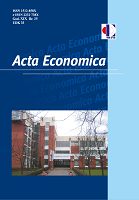ENERGY GENERATION AND AGGREGATE OUTPUT IN NIGERIA: EVIDENCE FROM NARDL
ENERGY GENERATION AND AGGREGATE OUTPUT IN NIGERIA: EVIDENCE FROM NARDL
Author(s): Musibau Ojo Adejumo, Rasak Adetunji AdefabiSubject(s): National Economy, Energy and Environmental Studies, Environmental and Energy policy, Economic development
Published by: Економски факултет Универзитета у Бањој Луци
Keywords: energy access; aggregate output; NARDL; energy supply; economic growth; energy generation;
Summary/Abstract: Energy generation has received a little or no attention over a period of time. Most scholars are focused on energy consumption and economic growth. This study empirically examined the asymmetric impact of energy generation on aggregate output in Nigeria between 1980 and 2019 using Nonlinear Autoregressive Distributed Lag (NARDL) Model. The stationarity test was conducted on the variables employed to avoid spurious regression. The result revealed that the variables were mixed at level and the first difference. The bound test result revealed that the variables are not cointegrated in the long run. Also, Wald test indicates that energy generation has short run impact on aggregate output in Nigeria. As revealed from the empirical results, from all sources of significant energy generation in Nigeria, gas generation brings the desired result to aggregate output in Nigeria. The study therefore suggests that action should refocus on the gas production subsector. This subsector needs to be developed carefully to avoid wasting this energy source by incineration. Also, the government should redirect those subsidies for petroleum products to the gas generation subsector.
Journal: Acta Economica
- Issue Year: 19/2021
- Issue No: 35
- Page Range: 181-196
- Page Count: 16
- Language: English

